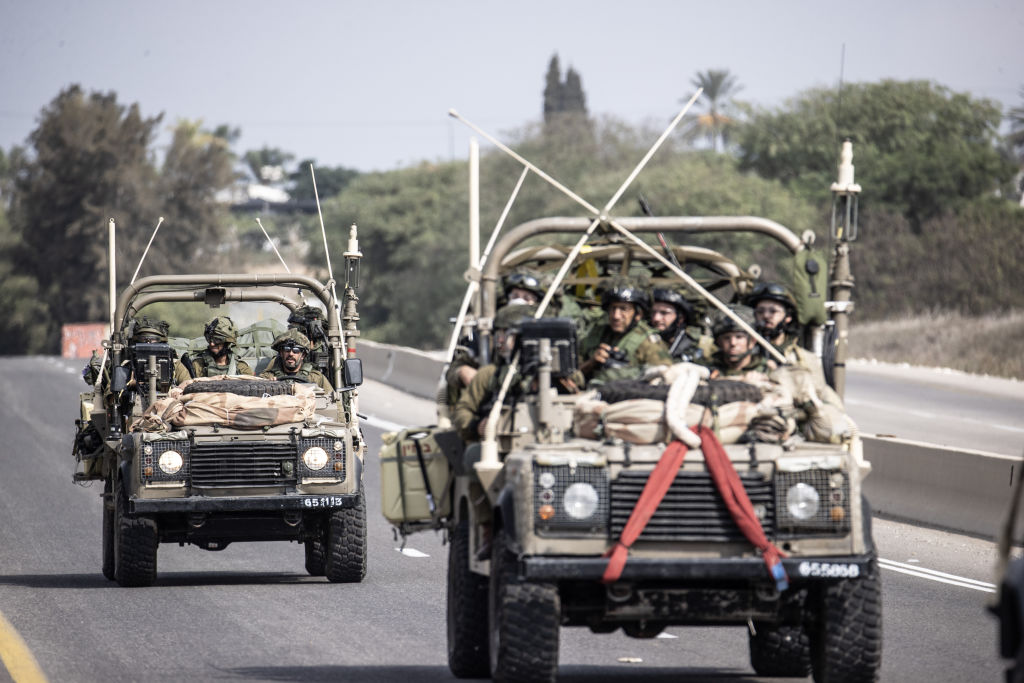Happy Tuesday. The Dispatch turned four years-old over the weekend, but with the weight of news no one felt much like celebrating. We launched the company to provide fact-based reporting and analysis on the important stories of the day, informed by conservative principles. We’re grateful you’re with us and please know that with the gravity of world events and the chaos of American politics, we’re as committed to doing this work today as we were on day one. Thank you for your support.
Quick Hits: Today’s Top Stories
- The Israeli military reported early this morning that it regained full control of its border with Gaza after the brutal attacks carried out over the weekend by Hamas terrorists. Israel also increased airstrikes in the zone, in an effort to completely eradicate the terrorist threat. In response to the airstrikes, Hamas has threatened to execute hostages should Israel continue its attack on Gaza, and has thus far closed the door on the prospect of a prisoner swap. Total confirmed deaths in Israel now exceed 900, with an additional 2,500 wounded, according to Israeli authorities. Palestinian authorities report nearly 700 people have been killed in Gaza.
- In a statement Monday, President Joe Biden announced that 11 American citizens had been among those killed in the attacks on Israel over the weekend, with more likely held hostage by Hamas. “In this moment of heartbreak, the American people stand shoulder-to-shoulder with Israelis,” the president said, likening the attack to those America suffered on September 11, 2001. “We remember the pain of being attacked by terrorists at home, and Americans across the country stand united against these evil acts that have once more claimed innocent American lives. It is an outrage. And we will continue to show the world that the American people are unwavering in our resolve to oppose terrorism in all forms.” The president is scheduled to deliver remarks on the crisis at 1 p.m. ET this afternoon. Meanwhile, National Security Council spokesman John Kirby told NBC News that the number of confirmed American dead is likely to increase in the coming days.
- Following concerns voiced by United Nations Secretary-General António Guterres, the European Union on Monday reversed its decision, announced over the weekend, to suspend payments to Palestinians, out of concern about the impact withholding funds would have on Palestinians not involved in the conflict.
- Western leaders underscored their commitments to Israel in a joint statement yesterday, reading: “Today, we—President Macron of France, Chancellor Scholz of Germany, Prime Minister Meloni of Italy, Prime Minister Sunak of the United Kingdom, and President Biden of the United States—express our steadfast and united support to the State of Israel, and our unequivocal condemnation of Hamas and its appalling acts of terrorism.” Chinese President Xi Jinping, too, amended previous official comments made on the conflict, more firmly denouncing Hamas’ attack after a meeting with Senate Majority Leader Chuck Schumer. The updated statement insisted that China “condemns all violence and attacks on civilians,” and the “most urgent task now is to reach a ceasefire and restore peace.”
- Amid concern and confusion over how the House of Representatives will handle the growing war in Gaza, former House Speaker Kevin McCarthy announced Monday that he would be willing to return to his onetime position if it is “what the conference wants.” McCarthy spoke with the head of the Knesset, Israel’s legislative body, and held a press conference on the events. Senate Minority Leader Mitch McConnell published an op-ed in the Wall Street Journal that included a four-point plan to offer American assistance to Israel, including sending increased “intelligence support” to Israel and bolstering U.S. military funding. Despite calls for rapid support by the U.S., questions remain over how quickly action can be taken—a speaker-less House and a looming government shutdown threaten prolonged inaction.
- President Biden voluntarily spoke with special counsel Robert Hur this week as part of an ongoing investigation into classified documents found at Biden’s private residence, the White House confirmed Monday. “As we have said from the beginning, the President and the White House are cooperating with this investigation, and as it has been appropriate, we have provided relevant updates publicly, being as transparent as we can consistent with protecting and preserving the integrity of the investigation,” a White House spokesman said.
- Robert F. Kennedy, Jr. ended his campaign for the Democratic nomination for president yesterday, declaring that he would instead seek the presidency as an independent candidate. Kennedy announced the move at a rally in Philadelphia, criticizing the leaders of both political parties. “For decades, Republicans have railed against Big Government, and Democrats have complained about Big Business,” Kennedy wrote in an op-ed for The Hill published to coincide with his announcement. “Behind the scenes though, they have capitulated to both.” Whether Kennedy’s candidacy will pull more voters from the Republican or Democratic candidate remains unclear.
- Former Rep. Will Hurd of Texas officially dropped out of the Republican presidential primary on Monday after failing to surpass one percent in most national polls, endorsing former United Nations Ambassador Nikki Haley as he leaves the race. “Our nation deserves a leader who can unite us and navigate the complex challenges we face, particularly when it comes to our national security,” Hurd wrote on X. “I believe Ambassador Nikki Haley is the best person in this race to do that. Ambassador Haley has shown a willingness to articulate a different vision for the country than Donald Trump and has an unmatched grasp on the complexities of our foreign policy.”
- American pharmaceutical giant Bristol Myers Squibb will acquire cancer drugmaker Mirati Therapeutics in a nearly $5 billion deal, the company announced Sunday. The merger, which was approved unanimously by each company’s board of directors, is expected to be finalized in 2024.
Israel Readies for Long War

After being caught flat-footed by Hamas’ surprise attack over the weekend, the Israeli Defense Forces (IDF) quickly mounted a forceful response—and on Monday, Prime Minister Benjamin Netanyahu made their goal clear. “Every place where Hamas is active and working will be completely destroyed,” he said in a prime-time address. “What we will do to our enemies in the coming days will reverberate with them for generations.”
Now four days removed from the initial wave of atrocities, the casualty numbers have continued to climb, solidifying the surprise strike as the deadliest attack in Israeli history. As of this morning, more than 900 Israelis—a majority of them civilians—have been confirmed dead, along with at least 687 Palestinians. But both those counts will continue to rise. First responders were still recovering bodies last night from the towns and villages terrorists attacked near the border, with more than 100 bodies removed from Be’eri alone—greater than 10 percent of the small kibbutz’s population.
In his remarks on Monday, Netanyahu laid out his case for the barrage on Gaza, drawing comparisons between Hamas and the terrorist group ISIS. “We always knew what Hamas is and now the whole world knows,” he said. “Hamas is ISIS and we will destroy it the way the enlightened world destroyed ISIS.”
Israeli Defense Forces continued their campaign against Hamas targets in Gaza on Monday, launching nearly 1,300 airstrikes, according to Israeli authorities, and destroying dozens of buildings. Meanwhile, IDF forces began assembling in southern Israel in preparation for a likely ground invasion of Gaza—the military has dubbed the war effort Operation Swords of Iron. As Israelis brace for a bloody and protracted conflict—potentially on multiple fronts—the country’s political leaders are working to sort out a unity governing coalition to weather the crisis.
“I can say now, finally, today, now many hours after Hamas invaded into southern Israel that Israeli security forces, IDF, police, and the others have reestablished control of southern Israel,” IDF spokesperson Jonathan Conricus said last night, 62 hours after the initial attack. IDF Rear Adm. Daniel Hagari reported early this morning that Israeli forces had also regained control of the Gaza border. And shifting to offense, Israeli Defense Minister Yoav Gallant announced yesterday a “complete siege” of Gaza, declaring electricity, food, water, and fuel would be cut off. “We’re fighting against human animals,” he said. “And we’re acting accordingly.”
More than 130 hostages—Israelis and foreign nationals, likely including U.S. citizens—remain trapped in Gaza, and Hamas leaders threatened yesterday that the group would begin executing the captives unless Israeli airstrikes stopped. “We announce that any targeting of civilian homes without advanced warning will be met regrettably with the execution of one of the enemy civilian hostages we hold, and we will be forced to broadcast this,” Abu Obaida, the spokesperson for Hamas’ Al-Qassam Brigades said in a statement.
The presence of hostages has further complicated an already difficult operation for the IDF. “We are engaged in formulating a full assessment of the situation and are acting with full force to create an effective mechanism, an address for all families that are anxious for the fate of their loved ones,” said Gal Hirsch, an IDF brigadier general appointed on Sunday to coordinate the response to missing and captured Israelis. Qatar is reportedly trying to mediate negotiations over a swap of Palestinians in Israeli prisons for the Gaza hostages—though Israeli officials denied that there were negotiations underway.
While the situation may be more in hand in the south, there are signs a new front could open up in the north. IDF forces said they killed multiple Islamic Jihad militants entering the country from Lebanon on Monday, and Hezbollah spokesmen said the group shelled Israeli military installations in response. Israel also returned artillery fire, and the Israeli air force struck a Lebanese village following the incursion.
Israel has mobilized more than 300,000 reservists over the last two days—the largest such mobilization in the country’s history. There is a strong sense of duty and unity among Israelis—including those who fiercely opposed the Netanyahu government’s proposed judicial reforms and boycotted reservist duty in protest in recent months. “It’s been striking to see them, literally overnight, pivot to all going and joining up with their reserve units and calling on Israelis to do whatever they need to do to support the IDF and the military effort,” Michael Koplow, the chief policy officer at the Israel Policy Forum, told TMD.
That sense of patriotism has yet to result in the formation of a unity government—a coalition of the main political parties represented in the Knesset usually formed during a crisis—but such a move appears imminent. Benny Gantz, head of the National Unity party, said he would join a government coalition if Netanyahu allows the National Unity party to have “real influence” in a war cabinet, and Yair Lapid, leader of the opposition and the centrist Yesh Atid party, has indicated he won’t join a unity government so long as the far-right Religious Zionism and Otzma Yehudit parties remain part of the governing coalition. Netanyahu on Monday signaled openness to such an emergency government of national unity of some kind, but “without any preconditions.”
If Netanyahu breaks with the right-wing parties now, he risks losing whatever chance he has of maintaining his hold on power after the current crisis abates. But some Israeli political observers believe that ship has already sailed. “Almost certainly, this disaster means the end of the Netanyahu government after the war is over,” Eugene Kontorovich, professor at George Mason University Scalia Law School and scholar at the right-leaning, Israel-based Kohelet Policy Forum, told TMD.
The longer the country goes without a unity government, the more heat Netanyahu will likely face. “It’s more likely that at some point, Netanyahu is going to have to get rid of his more extreme partners—certainly if he wants Yair Lapid to join and perhaps also if he wants Benny Gantz to join,” Koplow says. “Given the deep unpopularity of this government, even before Saturday, there’s going to be lots of pressure on him to do just that and to form a unity government, which is something that you normally would have seen already.”
Forming such a coalition would not only signal further a united Israeli front, but also could have practical consequences for the war effort. “Aside from Netanyahu himself, most of the experienced politicians with serious military chops are sitting outside of the government,” Koplow said. Gantz is a former defense minister, Lapid previously served as foreign minister and prime minister, and a number of other opposition lawmakers have been in high-level military and intelligence positions. “You look at all these guys, and you think that, of the people who you would want in a type of war footing in a cabinet, in terms of their experience and their advice, they’re all on the outside looking in.”
If Israel proceeds with its expected ground invasion of Gaza, the conflict will only become more challenging to navigate as casualties pile up on both sides of the conflict. A unified government, then, could prove important to maintaining public confidence in political leadership as the war progresses.
As the fighting continues, the number of Palestinian civilians caught in the crossfire will continue to rise. Gaza’s Hamas-run health ministry claimed Monday that 140 children have been killed thus far as a result of Israeli airstrikes targeting Hamas installations. “You may get the wrong impression that we are aiming for ordinary buildings, and you may hear people say that we’re trying to strike civilian targets,” Conricus, the IDF spokesperson, said yesterday. “That is nonsense. We are striking military targets belonging to Hamas.”
Israeli military officials have issued warnings in Arabic to people in Gaza to leave areas targeted for attack—some have even advised people to leave Gaza entirely through the Rafah crossing on the Egyptian border. But moving to safer areas can be a challenge for civilians in Gaza, a densely populated area.* Although Hamas maintains an extensive network of underground tunnels, Gaza lacks air raid sirens and bomb shelters. Prior to the attack, Israel often used a “roof knocking” system—text messages, calls, and an initially limited strike to the roof of buildings—to warn people an attack was imminent. But IDF officials have indicated such warnings may not be the norm in the current war, citing the broad public evacuation notices and the unprecedented nature of the Hamas attack.
While we are just days removed from the initial attacks, analysts are already beginning to unpack not only the intelligence failures but the operational failures that led to such a brutally successful assault. “Israel already understood a scenario like this could happen,” Joe Truzman, a Foundation for Defense of Democracies analyst focused on Palestinian and Lebanese terror groups, told TMD. “However, and this is important, [they thought] that this scenario wouldn’t happen from Gaza, it would happen from the north, from Hezbollah, the infiltration of Hezbollah Radwan units, or their commando units or special forces units, into the Galilee region. I don’t think they ever expected it to come from Gaza.”
Hindsight is 20-20, of course, but former Israeli security and intelligence officials have since argued that the signs of an impending attack were present. “After we are able to probe this, we will see that we knew almost everything,” said Aharon Ze’evi Farkash, former head of the IDF’s military intelligence branch. “There were intelligence assessments hours before. The question is, did we understand what we knew?”
Yaakov Amidror, a former national security adviser to Netanyahu, provided a starker assessment: “This operation actually proves that the [intelligence] abilities in Gaza were no good.”
An anonymous Egyptian intelligence official claimed yesterday that Netanyahu’s government had ignored warnings that Hamas was planning “something big,” but Netanyahu strongly denied the report, cautioning Israelis against “fall[ing] into these propaganda traps.”
Saturday’s attack also raises questions about the preparedness of IDF ground forces. “This isn’t just an intelligence failure, it’s also a real failure of the IDF operationally,” Koplow told TMD. The bulk of IDF forces were stationed in the West Bank on Saturday, contributing to the slow response time to the incursion in the south.
Some Western observers argue the war has exposed the weakness of Israel’s conscripted forces. “Israel has an excellent air force and elite special-operations units, but its conventional line units—made up mostly of conscripts—are neither particularly well trained nor well disciplined by American standards,” argued Andrew Exum, a former United States deputy assistant secretary of defense who assessed Israeli military needs as part of a U.S.-Israel military aid review in 2016. “The country’s semi-professional military relies heavily on conscripts and reservists, which places it at a disadvantage in many respects. Full-time, professional militaries can dedicate themselves to rehearsing collective tasks that high-intensity combat situations often require: reacting to ambushes, conducting raids, incorporating artillery and airpower into maneuvers. Conscript militaries, by contrast, are forever bringing on and training new people.”
Such early criticisms in the middle of a war risk veering into armchair strategizing, but the inability of the IDF to stop the attack sooner has shaken Israelis’ confidence in their military. Questions will persist about Israel’s preparedness for such a devastating attack—but what is clear is that the country has a long road ahead. “This isn’t a, let’s say, 11-day conflict like we saw in 2021,” Truzman said. “I highly doubt it’s going to be a [40]-something-day conflict like we saw in 2014.”
“If Israel is going to attempt to destroy Hamas and Islamic Jihad completely,” he said, “it’s going to take them many months to do that.”
Worth Your Time
- Amir Tibon is an Israeli journalist living in a small community on the Israel-Gaza border and, critically, out of reach of Iron Dome missile defenses. Tibon survived the attacks over the weekend, and was able to evacuate to safety. He sat down for an interview with The Atlantic and offers one of the best firsthand accounts of the attacks we’ve read yet. “I called … my father,” said Tibon. “My father is a retired general. He’s 62 years old. He lives in Tel Aviv. And my parents told me, ‘We’re coming. It’s an hour-and-20-minute drive.’ Now, this goes against all logic. But I told myself, Okay, right now I’m asking my two young daughters to put complete faith in me and my wife, in their parents, to do what we’re telling them in order to save their lives, which is to be very, very quiet and understand that we cannot get out of the room, we cannot go get food, we cannot go to the bathroom, we cannot go out to play, and I’m asking them to put their faith in me completely. And I told myself, I have to do the same thing right now. I have to trust my father, who is a trustworthy man, that if he said he will come here and save us, he will do it.”
Presented Without Comment
Mediaite: [Anti-Defamation League] Director Asks If Hamas is Writing MSNBC’s Scripts
Also Presented Without Comment
The Times of Israel: UN Human Rights Council Marks Loss of Life in “Palestinian Territory and Elsewhere”
Also Also Presented Without Comment
Rolling Stone: ‘The Eras Tour’ Movie: Theater Employees Brace for Rowdy Swifties and Concert Culture
Toeing the Company Line
- It’s Tuesday, which means Dispatch Live (🔒) returns tonight at 8 p.m. ET/5 p.m. PT! The team will discuss the awful events of the past few days and, of course, take plenty of viewer questions. Keep an eye out for an email later today with information on how to tune in.
- Alex fact checked a viral video claiming Ukraine is now conscripting women into military service.
- In the newsletters: Kevin considered the usefulness of the Problem Solvers Caucus (🔒), the Dispatch Politics team analyzed the impact of Hamas’ sudden attack on the 2024 election, and Nick looked at (🔒) the divides within the Democratic coalition on the Israeli-Palestinian conflict.
- On the podcasts: Sarah and David discuss the law of war in light of the Israel-Hamas war, and David dives deeper on the subject on The Skiff (🔒).
- On the site today: Kevin interviews an Israeli living in the West Bank, Daniel Darling reflects on the war and the need for responsible governance in the U.S., Emanuele Ottolenghi argues this spells the end of both the one-state and two-state solutions for Israel, and Stirewalt writes on college and wealth and status.
Let Us Know
Do you think Israel will maintain its current levels of international support in its war against Hamas if the conflict lasts as long as Truzman expects?
Clarification, October 10, 2023: This newsletter originally referred to Gaza as “one of the world’s most densely populated areas.” The strip of land is densely populated, but there are many areas in the world that are even more so.







Please note that we at The Dispatch hold ourselves, our work, and our commenters to a higher standard than other places on the internet. We welcome comments that foster genuine debate or discussion—including comments critical of us or our work—but responses that include ad hominem attacks on fellow Dispatch members or are intended to stoke fear and anger may be moderated.
With your membership, you only have the ability to comment on The Morning Dispatch articles. Consider upgrading to join the conversation everywhere.